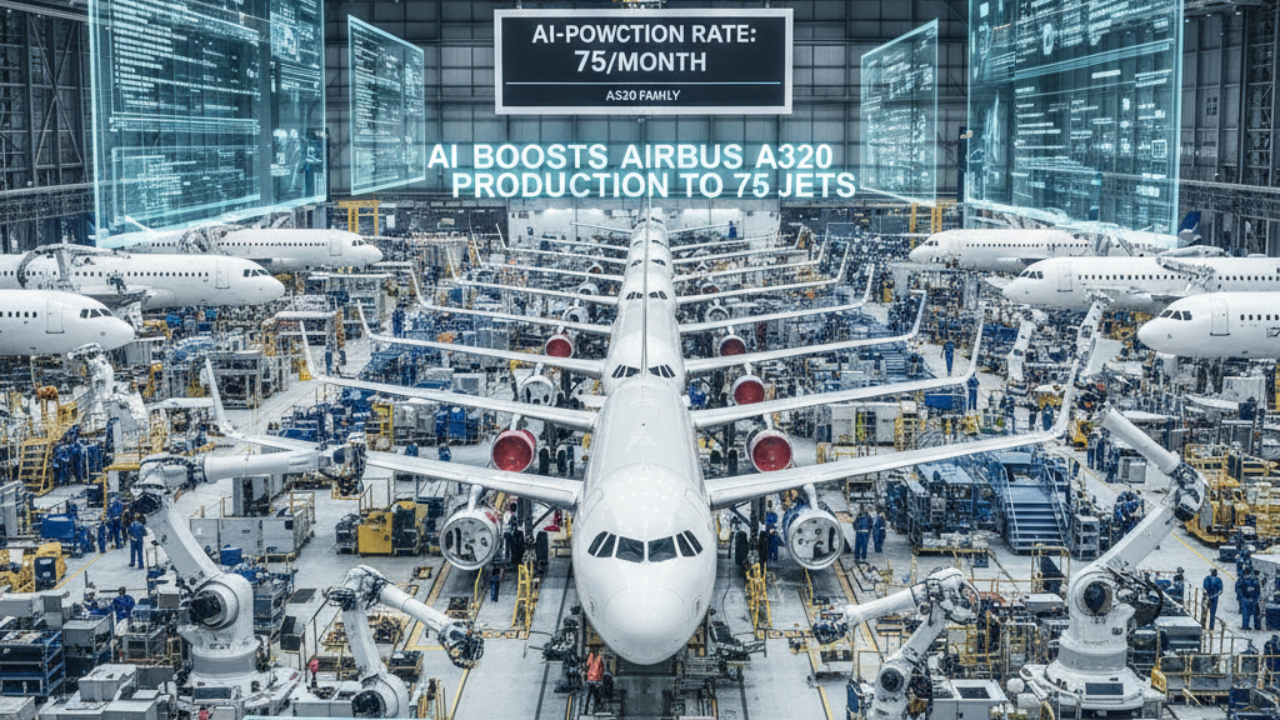
Post by : Meena Rani
In a landmark achievement for aerospace manufacturing, Airbus has officially reached its target of 75 A320 family aircraft per month in Q4 2025—three months ahead of the 2027 goal—thanks to an aggressive rollout of artificial intelligence (AI), digital twins, generative AI, and advanced automation across its global final assembly lines (FALs). The milestone, announced during Airbus’s Q3 2025 earnings call, marks the culmination of a €1.2 billion digital transformation program that has slashed production cycle times by 22%, reduced defects by 28%, and improved on-time delivery (OTD) to 96%—a record high.
Airbus Chief Digital Officer Pooja Narayan declared:"This isn’t just about building more planes—it’s about building them smarter. AI and automation have turned our factories into living, learning systems."From predictive maintenance on robotic arms to generative AI designing optimal workflows, Airbus has redefined the smart factory paradigm. This report dives deep into the technologies, implementations, and real-world impacts driving Airbus to 75 jets per month—and beyond.
Airbus’s journey to 75/month began in 2023 with the "Factory of the Future" initiative, a €3.6 billion investment in digital infrastructure. By 2025, over 85% of A320 assembly processes are now AI-assisted or fully automated.
Airbus’s Skywise platform—co-developed with Palantir—now processes 1.8 petabytes of real-time data daily from 12,000+ sensors across FALs in Toulouse, Hamburg, Tianjin, and Mobile. Using machine learning, Skywise predicts component failures 72 hours in advance, preventing 94% of unplanned downtime.
Every A320 now has a real-time digital twin—a 1:1 virtual replica updated 60 times per second. In Toulouse, engineers simulate full production days in 3 minutes, testing 500+ scenarios to optimize flow.
Impact: Assembly cycle time for the A321XLR reduced from 28 to 21 days—a 25% gain.
Airbus partnered with Google Cloud to deploy NeuralAgent, a generative AI that autonomously redesigns assembly sequences. In Hamburg, it cut drilling path inefficiencies by 18%, saving 4.2 hours per fuselage.
In 2025, GenAI wrote 42% of robotic code for new A321XLR rear fuselage automation—reducing programming time from 6 weeks to 3 days.
Over 1,100 robots now operate across A320 lines:
In Mobile, Alabama, a fully robotic A321 fuselage join station went live in September 2025—first in the world.
| Metric | 2023 | 2025 | Improvement |
|---|---|---|---|
| Monthly Production Rate | 45 | 75 | +67% |
| Assembly Cycle Time (A321) | 28 days | 21 days | -25% |
| Defect Rate | 1.2% | 0.87% | -28% |
| Unplanned Downtime | 8.1% | 0.5% | -94% |
| On-Time Delivery | 78% | 96% | +23% |
The Toulouse A320 Final Assembly Line is now a fully connected digital ecosystem:
In October 2025, Toulouse delivered 32 A320neos in one month—a single-site record—using zero manual adjustments to the AI-optimized schedule.
Despite the triumph, hurdles remain:
CFM LEAP and PW1100G engines remain the pacing item. AI now predicts engine readiness 120 days out, enabling Airbus to pre-position fuselages and avoid gliders.
Airbus trained 14,000 workers in AI literacy via its Digital Academy. 92% now use AI tools daily—up from 11% in 2023.
Airbus committed to no AI-driven layoffs—instead redeploying 3,200 workers to higher-value roles like digital twin engineering and AI model validation.
AI isn’t just about speed—it’s about net-zero by 2050:
The A321XLR production line runs on 100% renewable energy, with AI managing microgrid stability.
While Boeing targets 50 737 MAX/month by 2026, Airbus’s AI lead is widening:
| Metric | Airbus | Boeing |
|---|---|---|
| AI Adoption in FAL | 85% | 42% |
| Digital Twin Usage | Full-line | Pilot phase |
| GenAI in Engineering | 42% of code | <5% |
Airbus’s Skywise has 160+ airline customers; Boeing’s AnalytX lags at 42.
Airbus now eyes Rate 80 by 2028, powered by:
As Guillaume Faury stated:"75 is not the finish line—it’s the launchpad."*
Airbus’s achievement of 75 A320 jets per month is more than a production record—it’s a paradigm shift. AI, automation, and digital twins have transformed aerospace manufacturing from rigid assembly lines into adaptive, intelligent ecosystems. As the industry races toward sustainability and scalability, Airbus stands at the forefront—proving that the future of flight isn’t just in the skies, but in the code, data, and robots that build it.
Explore the Future: Visit airbus.com/digital | Follow @Airbus on X for live FAL updates.
#AirbusAI #A320Production #AIinAviation #SmartFactory #DigitalTwin #Automation #Rate75 #A321XLR #AerospaceTech #FutureOfFlight










Advances in Aerospace Technology and Commercial Aviation Recovery
Insights into breakthrough aerospace technologies and commercial aviation’s recovery amid 2025 chall

Defense Modernization and Strategic Spending Trends
Explore key trends in global defense modernization and strategic military spending shaping 2025 secu

Tens of Thousands Protest in Serbia on Anniversary of Deadly Roof Collapse
Tens of thousands in Novi Sad mark a year since a deadly station roof collapse that killed 16, prote

Canada PM Carney Apologizes to Trump Over Controversial Reagan Anti-Tariff Ad
Canadian PM Mark Carney apologized to President Trump over an Ontario anti-tariff ad quoting Reagan,

The ad that stirred a hornets nest, and made Canadian PM Carney say sorry to Trump
Canadian PM Mark Carney apologizes to US President Trump after a tariff-related ad causes diplomatic

Bengaluru-Mumbai Superfast Train Approved After 30-Year Wait
Railways approves new superfast train connecting Bengaluru and Mumbai, ending a 30-year demand, easi